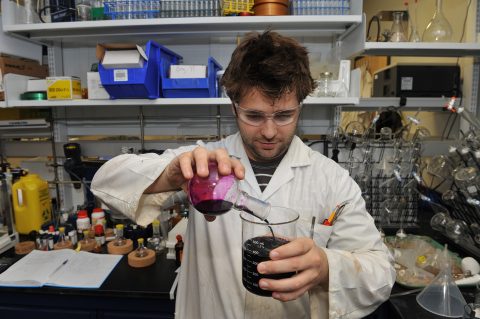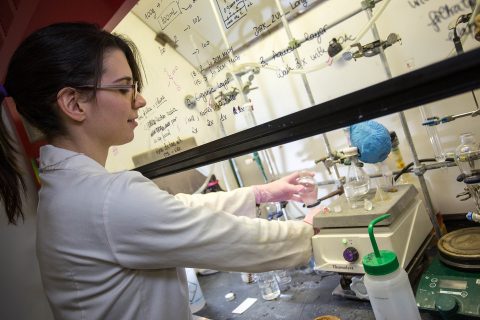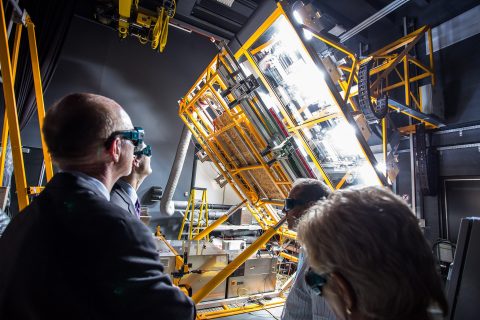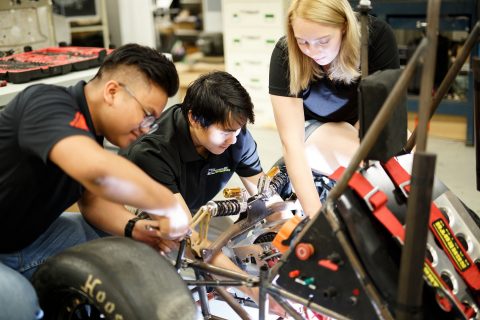Chemical Engineering (BEng)
Virtual information sessions
Want to know how we're training the next generation of engineers and computer scientists? Join us to learn about the Gina Cody School's undergraduate programs and plans to advance integrated technologies in a socially responsible manner.
Why study Chemical Engineering?
Chemical engineers design large-scale processes that transform raw materials into valuable products, playing a crucial role in industries such as energy, pharmaceuticals, food production and environmental management. At Concordia, you’ll gain the skills to develop sustainable solutions to global challenges, from clean energy technologies to advanced materials.
You’ll work with cutting-edge technologies and learn from expert faculty members in fields like green chemical processes, nanomaterials, battery materials and environmental diagnostics. Montreal’s thriving chemical and pharmaceutical industries provide unique opportunities for internships and career growth.
Program highlights
- Hands-on learning through labs, projects and industry placements
- Strong focus on sustainability and green engineering
- Access to state-of-the-art research facilities and experienced faculty
- Industry collaborations and networking opportunities in Montreal’s chemical sector
- Technical electives in areas like energy transition and storage, polymers, process design and life cycle assessment, biotechnology, materials science or environmental engineering
Special funding for out-of-province students
Up to $4000 for undergraduate programs.
Program structure
The Bachelor of Engineering in Chemical Engineering takes a minimum of four to five years (120 – 150 credits) of full-time study, depending on your academic background.
The Chemical Engineering program includes the following:
- Engineering core courses
- Chemical Engineering core courses (both theoretical knowledge and hands-on laboratory work)
- One general and one technical elective course
Courses
The curriculum consists of the Chemical Engineering core and electives.
Sample projects
- Sustainable chemicals – Design chemical processes for production of biochemicals and biofuels from renewable feedstocks
- Sustainable bioplastics – Design biodegradable packaging materials to reduce plastic waste
- Carbon capture and conversion systems – Develop chemical processes for capturing, storing and utilizing CO₂ emissions
- Next-generation battery materials – Create innovative materials for high-efficiency energy storage
- Pharmaceutical process design – Optimize drug manufacturing for better efficiency and sustainability
- Water purification technologies – Design advanced filtration systems for clean drinking water
Co-op program
The Co-op program gives you the chance to complete paid work terms that last 12 to 16 weeks. As a Co-op student, you may:
- Develop and optimize chemical processes in an industrial setting
- Work on sustainable energy solutions such as biofuels and hydrogen production
- Design and analyze advanced materials for various industries, including aerospace and pharmaceutical
- Conduct environmental assessments to improve waste management and pollution control
Admission criteria
Minimum cut-off averages and course requirements
- Quebec CEGEP: 25 overall, 23 math, 22 physics
- Admission is based on applicants’ overall math and physics CRC indicated above and completion of the following classes as part of their DEC: General Chemistry 1; Calculus 1 and Calculus 2 and Linear Algebra; Mechanics and Electricity and Magnetism.
- Additional information for CEGEP applicants
- High school: B overall, B in math, B- physics
- One math from Pre-Calculus, Calculus or equivalent
- Grade 12 or university-preparatory physics
- Canadian curricula course requirements
- Accepted international qualifications
- ACT or SAT is not required
- AP exams are not required but may qualify you for advanced standing
- Indigenous Bridging Program: First Nations, Inuit and Métis students who do not meet Concordia’s conventional admission requirements may be eligible for admission through the Kaié:ri Nikawerá:ke Indigenous Bridging Program
- International Baccalaureate (IB) diploma: 29 overall, 4 HL or 5 SL math, 4 HL or SL physics
- Accepted math: Applications and Interpretations HL, Analysis and Approaches SL or HL
- Math or physics course must be HL
- International Baccalaureate Career-related Programme (CP): 4.8/7 overall, 4 HL or 5 SL math, 4 HL or SL physics
- Accepted math: Applications and Interpretations HL, Analysis and Approaches SL or HL
- Math or physics course must be HL
- Additional Career-related Programme (CP) course requirements
- Baccalauréat français: 13 overall, 13 math, and 12 in physics
- Required courses:
- Première: Spécialité mathématiques and Spécialité physique-chimie
- Terminale: Spécialité mathématiques (also accepted, Spécialité Physique-Chimie and Mathématiques Complémentaires)
- Additional information for Baccalauréat français applicants
- Required courses:
- British system of education (GCE):
- A-levels: At least two A-level exams CC, C in math, C in physics or
- AS-levels: At least 4 AS-level exams with equivalent results or
- BTEC: Level 3 Diploma or Extended Diploma in a related subject area with equivalent results
- Students without math or physics A-levels may be admissible based on AS-level or iGCSE/GCSE/O-Level exam results. Students should include all their exam results from iGCSE (or equivalent) onwards to support their application.
- Additional information for British System of Education (GCE) applicants
- University transfer (internal): 2.5 overall, 2.5 in math/physics, 1.7 in courses offered by the Gina Cody School of Engineering and Computer Science
- PHYS 204 or 205 (or equivalent)
- At least two of the following (or equivalent): MATH 203, 204, 205
- University transfer (external): B- overall, B in math, B- in physics
- Courses in the disciplines of Calculus, Chemistry and Physics
Minimum cut-off averages should be used as indicators. The cut-off data may change depending on the applicant pool. Applicants who meet the stated minimum requirements are not guaranteed admission to these programs.
Application deadlines
It’s not too late to apply
Most undergraduate programs are still accepting applications for fall 2026.

FALL ENTRY (September)
Deadline: March 1
U.S. and international applicants: Apply no later than February 1 to allow time for immigration document processing. However, applying earlier is strongly recommended. Immigration processing times vary by country and delays could prevent you from starting your studies on time.

WINTER ENTRY (January)
Deadline: November 1
U.S. and international applicants: Apply no later than August 1 to allow time for immigration document processing. However, applying earlier is strongly recommended. Immigration processing times vary by country and delays could prevent you from starting your studies on time.
We reserve the right to close admission to a program at any time after the official deadline without prior notice.
Funding note
United States students: A U.S. Federal Student Aid-eligible version of this program is offered. This version meets all U.S. regulations (such as no co-operative education or e-courses) for eligible programs.
Accreditation
The BEng in Chemical Engineering is designed to meet the accreditation criteria of the Canadian Engineering Accreditation Board (CEAB). Under CEAB procedures, accreditation is granted only after students have graduated from the program, and a review is completed in the final year of the first graduating class. The program will follow this process and the department will keep students informed of the review outcome and our accreditation status.
After your degree
A Bachelor’s degree in Chemical Engineering opens doors to careers in a variety of industries, including:
- Energy and renewables (biochemicals, biofuels, hydrogen production, carbon capture)
- Pharmaceuticals and biotechnology
- Environmental consulting and waste management
- Materials science and nanotechnology
- Food and beverage production
- Oil, gas and petrochemicals
Graduates work for leading companies such as Novartis, Hydro-Québec, SNC-Lavalin and global chemical manufacturers such as BASF and DOW. Some alumni pursue graduate studies in specialized areas like chemical process optimization, environmental engineering, sustainable energy solutions, and biotechnology, while gaining the opportunity to work on cutting-edge projects and further specialize in areas of passion.
Other programs of interest

As a chemist, your mastery of chemical reactions could lead to the creation of environmentally-friendly materials like compostable plastics or medications that fight disease.
Department
Department of Chemistry and Biochemistry
Faculty

As a biochemist, you will study the chemical processes that occur within the cells of living organisms.
Department
Department of Chemistry and Biochemistry
Faculty

Protect water resources. Design buildings, bridges and tunnels. Improve transportation and traffic flow. As a civil engineer, your expertise in urban and environmental planning lets you guide municipalities to create the structures and systems that have a positive impact on everyday community life.
Department
Department of Building, Civil and Environmental Engineering
Faculty

The BCompSc in Health and Life Sciences will place you at the rich intersection of computer science and biology, providing a solid foundation in computer science while giving you the additional knowledge and skills to pursue a career or further studies in the health and life sciences.
Department
Department of Computer Science and Software Engineering
Faculty

Build engines. Design robots. Control explosions. As a mechanical engineer, you will create, construct and control machines. Whether it’s a vehicle, an aircraft engine or an assembly line, mechanical engineers know how to fit that square peg into a round hole, and do it with a little finesse.
Department
Department of Mechanical, Industrial and Aerospace Engineering
Faculty

